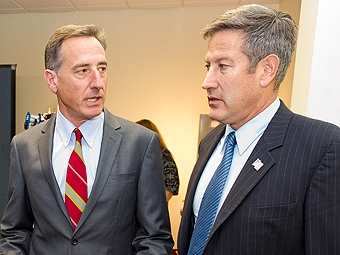 (Host) With the race for governor looking extremely close, Vermont’s 180 lawmakers could end up casting the final vote.
(Host) With the race for governor looking extremely close, Vermont’s 180 lawmakers could end up casting the final vote.
That’s because if no candidate wins more than 50 percent of the vote, the contest goes to the Legislature.
As VPR’s John Dillon reports, this scenario has unfolded several times over Vermont’s history.
(Dillon) The VPR Vermont Poll taken last week shows that voters are almost evenly divided in their choice for governor. Republican Brian Dubie and Democrat Peter Shumlin are tied at this point, while the third party candidates collectively have 5 percent support.
Eric Davis is a retired political science professor from Middlebury.
(Davis) "That could be enough to keep both Dubie and Shumlin below the 50 percent mark and thus the election will get thrown into the Legislature in January."
(Dillon) If the race goes to the Legislature, the state Constitution says the 180 lawmakers vote by secret ballot.
Should lawmakers decide based on who won the most votes? Should they vote their conscience, or their party. Or should they follow how their district voted?
Ask the leading candidates about the legislative scenario and you get almost the same answer. Here’s Peter Shumlin.
(Shumlin) "I am not going to have to tell the Legislature anything because I am convinced that we’re going to get more than 50 percent. We have tremendous momentum right now."
(Dillon) And Brian Dubie expresses similar confidence.
(Dubie) "My focus is going over 50 percent. The Constitution is very clear about the process that will happen. But that’s not my focus. My focus is going over 50 and look forward to celebrating victory November 2."
(Dillon) The framers of the Constitution apparently didn’t document why they gave lawmakers a role in deciding close elections. Gregory Sanford is the state archivist.
(Sanford) "There was certainly a feeling that the representatives were trustees. That is, they could use their judgment to make a decision because they were really representing the people."
(Dillon) Over the years, legislators have picked second-place winners – even a third-place winner, Sanford says. Vermont’s first governor, Thomas Chittenden, won a plurality of the popular vote in the 1780s. But when it went to the Legislature, lawmakers chose the runner-up.
(Sanford) "Because the legislators were aware that there had been some questionable land dealings in which Chittenden was at least marginally involved."
(Dillon) Lawmakers are supposed to use independent judgment in making the choice. But Sanford says there’s a risk to the candidate if they take office without a plurality of the popular vote.
(Sanford) "There is a risk to that in terms of how Vermonters perceive legitimacy and how the rest of government, including the Legislature, perceives that."
(Dillon) The last time the governor’s race went to the Legislature was in 2002. It was a three-way race, and Democratic candidate Doug Racine urged lawmakers to vote for Republican Jim Douglas, who had won a clear plurality.
For VPR News, I’m John Dillon in Montpelier.